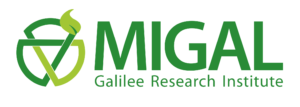 The Galilee Research Institute (MIGAL) is an interdisciplinary applied research organization whose mission is to advance discoveries from basic research into an applied outputs and start-up companies and thereby serve as an economic generator of regional and national significance.
The Galilee Research Institute (MIGAL) is an interdisciplinary applied research organization whose mission is to advance discoveries from basic research into an applied outputs and start-up companies and thereby serve as an economic generator of regional and national significance.
The R&D ecosystem of MIGAL supports strong collaborations and encourages interactions between academia, agriculture sector and industry, leveraging public and private sector resources to foster ties and encourage commercial growth. We combine strong academic research with extensive practical experience in providing a valuable bridge that connects researchers and farmers.
Research in MIGAL encompasses a wide range of disciplines including biotechnology, chemistry, microbiology, immunotherapy, drug discovery, clinical nutrition, computer sciences, agriculture and environmental sciences. Our research groups often work together and implement new and innovative approaches that produce sustainable solutions to important challenges. The field of Precision Agriculture is especially emphasized at MIGAL since we have 10 Experimental Research Farms that act as pilots and to which farmers are invited. This lead to pilots/demonstration sites in the farmers locations.
The Galilee Research Institute is internationally recognized as a hub of agro-innovation, in which we operate drones, IPM management, sophisticated irrigation methods in the fields.
MIGAL offers a unique opportunity for leading researchers who wish to become involved in applied research and in R&D efforts based on their innovative ideas. Our Research-Entrepreneurs program enable researchers to pursue high-risk commercialisation oriented projects.
MIGAL, at its Experimental Farms will conduct numerical experiments using different climate scenarios and different land uses and farming practices (irrigation, tillage, non-tillage, conservation agriculture) in order to identify the best land design strategies and farming policies to mitigate the climate influences at the different farms it owns. Based on the results of the numerical experiments MIGAL will propose rural policies to follow in order to reduce the climate risks in agriculture. MIGAL will demonstrate to the farmers in the region good practices in farm and livestock management. MIGAL will be involved in building strategy, based on the workshops and discussions with farmers and the Regional Authorities for post project activities, and exploitation of the STARGATE climate smart farm management tools and policy recommendation. It will establish a regional stakeholder’s community and a Living lab in horticulture agriculture, based on its Precision Agriculture Department. MIGAL's activities in horticulture will support the project in examining the environmental change impact on farming practices and the sustainable use of fertilizers as droughts have caused a shift in the farming methods.

